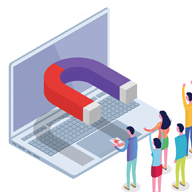More than semantics: Digitization, Digitalization, Digital Transformation

Digital & Technology
304 week ago — 5 min read
Digitization. Digitalization. Digital Transformation. It’s definitely more than semantics or wordplay. But what’s the difference and how do you distinguish one from the other?
Let’s simplify. Digitization is a process; in simple and easy to understand terms, automating paper-based processes from analog to digital. Let’s take a bank as an example. In the early banking days, when we wanted to check our balance, we’d have to physically go to the bank. Today, with information available online, it has eliminated the physical interaction we have with banks. The process of turning your information online is called digitization.
While digitalization is all about the experience. It is the use of digital technologies to enable digitized business models, workflows and processes. It’s not just switching from manual to automation, but it creates an interaction. Going back to our example, we used to only pay in cash; however, digitalization has benefitted customers by facilitating cashless transactions. We use the available “digitised” information online to create a digital experience. So then we can also say that having a digital experience is part of using a piece of technology; hence, digitalization and not just digitizing information. And when the entire business has been digitized and a digital environment/experience has been created only then we can say that a business has been digitally transformed. The coordinated change effort at scale, diffused in all aspects of business is described as digital transformation.
Also read: 5 ways digital has impacted the growth of businesses
While all the three differ, all three are significant. You cannot digitize without digitalization, thus achieve digital transformation.
It all starts with embracing digitization in your business. As one leads to another, you can enhance your customer experience and create a more efficient workplace as it reduces human error.
Today, there’s a paradigm shift in engagement, customers expect fast, easy and uninterrupted services and experience. And those things can only be achieved when you create an effective digital experience. The entire hype about digital transformation is no longer a hype, but a need for businesses to adapt.
Also read: Why does your business need digital transformation now?
When do you adapt? The answer is NOW. With so many available tools and systems you can put in place, you can never run out of options. But to find which technology tool best suited to your business can be a challenge. The reality that so many startup companies tend to focus on only a particular aspect of business doesn’t help. If it will help you to decide, make sure you go with a tech company who has the flexibility to grow with your business like that of Kiu.
In the digital age, cost, speed, ease and seamlessness of operations matter most. A business might be functional (at the moment) but it certainly cannot lead to the path of evolution without digitization. Businesses should start to shift from reacting to new technologies into starting innovation. That’s where Kiu Business Management Platform (BMP) steps in. Our cloud-based applications for sales, service, marketing, and more don’t require IT experts to set up or manage — simply log in and start connecting to customers in a whole new way. Your data is secured and controlled only by you. Kiu BMP also includes AI credit scoring engine enabling you to access loans from Kiu’s partner banks and MFI to support you as you scale up your business.
Start your digital journey now!
To explore business opportunities, link with us by clicking on the 'Connect' button on our eBiz Card.
Disclaimer: This article is based solely on the inputs shared by the featured members. GlobalLinker does not necessarily endorse the views, opinions & facts stated by the members.
View Chesca 's profile
Other articles written by Chesca Garcia
Don't be another digital transformation horror story
296 week ago
Most read this week












Comments
Share this content
Please login or Register to join the discussion